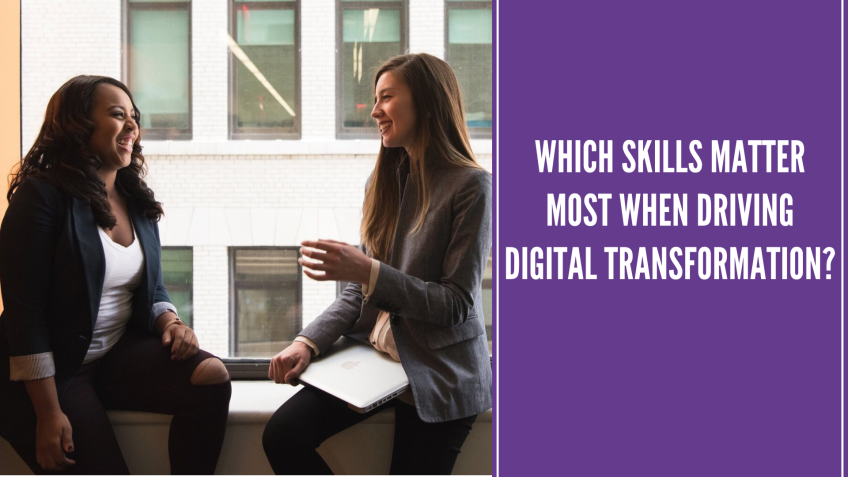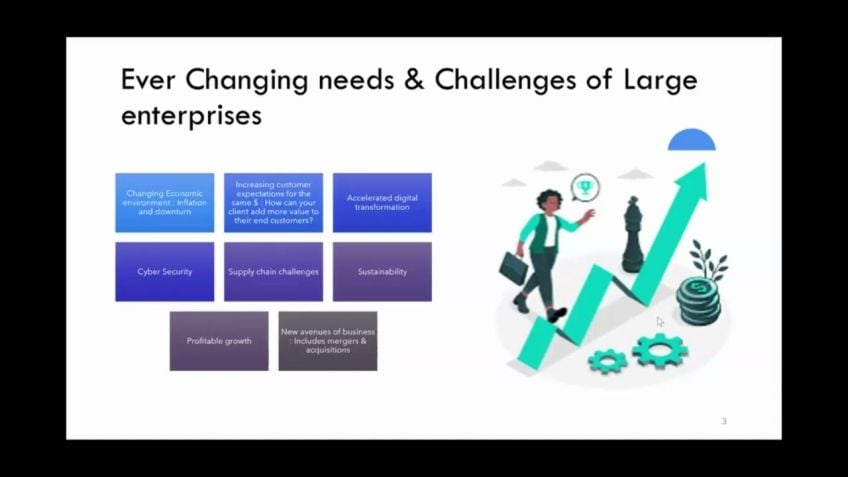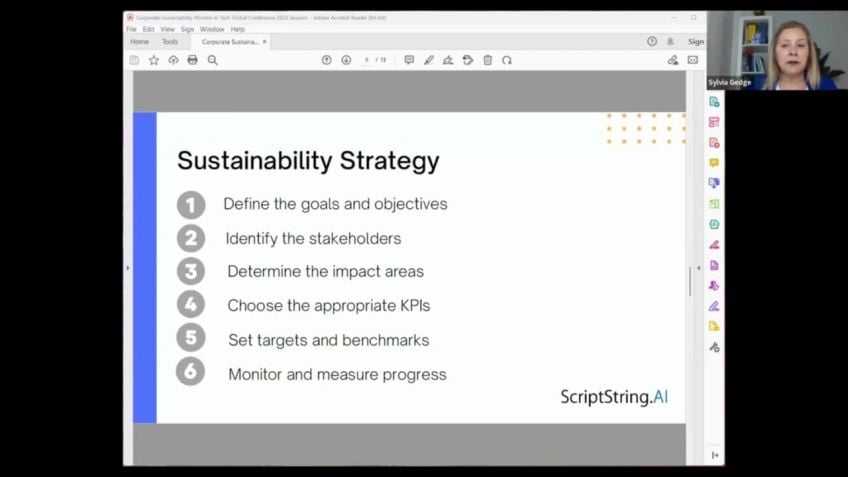Cultural drivers for digital transformation
Demystifying Digital Transformation: A Chat with Kate Maxwell of Microsoft
Today, I had the pleasure of speaking with Kate Maxwell, the Chief Technology Officer for Worldwide Defense and Intelligence at Microsoft. With vast experience in serving up technology solutions to the public sector and allied defense organizations around the world, Kate graciously shared her insights about digital transformation—the triumphs, the pitfalls, and the culture involved.
Understanding Digital Transformation
At its core, digital transformation is about embracing and applying technology. Kate provided a comprehensive definition: "Digital transformation is about taking a digital-first approach to all aspects of your business. It's about moving processes and data to the cloud, automating traditional tasks, embracing IoT (Internet of Things) approaches, employing robotics, and leveraging AI and machine learning."
While digital transformation is necessary for a business to remain relevant in a digital economy, Kate argues that it is about much more than technology and systems. In a nod to Peter Drucker's famous quote, she underlined that "culture eats strategy for breakfast"—that the real success of digital transformation relies on people and culture, not just tech-savvy strategies.
Microsoft’s Digital Transformation Journey
Kate shared Microsoft's digital transformation story as an example, attributing its success largely to the cultural overhaul led by their CEO, Satya Nadella. His emphasis on people-experience both for internal Microsoft employees and for their customers drove massive positive change across the company.
Digital Transformation Maturity Model
Kate introduced us to Microsoft’s 'Digital Transformation Maturity Model'. With four digital transformation horizons, this model serves as a roadmap for organizations to assess where they are and where they want to reach in their digital journey. However, understanding why an organisation is transforming is crucial to its success.
The Key Cultural Enablers of Digital Transformation
- Business process: Digital transformation requires overhauling the entire business. It’s necessary to rethink the way a business manages operations, measures progress, and coordinates with customers.
- Communications and Organisational Change Management: Good communication fosters empathy, compassion, and a deep understanding of the user experience.
- Risk and Reward: Encourage bigger, more long-term thinking and accept that failure can, and should be, part of the process.
- Workforce Education: Make sure that employees across different generations are offered training opportunities that can support the digital transformation.
- Diversity and Psychological Safety: Diverse perspectives drive innovation. Companies should foster a workplace where all employees feel secure in bringing new ideas and approaches.
Kate concludes with a compelling truth - the companies that can adapt to changes and embrace technology the fastest will be the ones that thrive. Embrace risk-taking, keep an open mindset, and above all, keep the human experience at the core of everything. In doing so, you are setting up your company's digital transformation journey for success.
Video Transcription
Um So as Margo shared, my name is Kate Maxwell. I'm the Chief technology Officer for Worldwide Defense and Intelligence at Microsoft. And like many of you out there in the audience, I am a technologist at heart.I have spent my entire career serving up technology solutions to the global public sector and more specifically to allied defense organizations around the world. So during this time, I've supported a lot of organizations as they embark on their digital transformation journeys.
And I've seen what that looks like when all goes well. And I've also seen what that looks like when it doesn't go so well, right? Digital transformation is hard, but it's also one of the most important transformations that any organization can undergo. So before we jump into some of the cultural enablers for this, I recognize that there's a lot of buzzword bingo out there around the topic of digital transformation. So let's talk a little bit about what that really means and then how companies can prepare for it. So when we talk about digital transformation, what I mean by that is that this is about embracing and applying technology and really taking a digital first approach to all aspects of your business, right? It's about moving processes and data to the cloud. It might be about automating what has traditionally been painful tasks, things like metrics, collection and reporting. It might be about embracing an internet of things approach and perhaps you censor your factory or your production lines to get more data and insights out of them.
You might consider employing robotics for things like inspection and validation and all things dull and dangerous. And hopefully, it's about you leveraging artificial intelligence and machine learning to not just manage but to truly harness your data as an asset. So you can get new insights about your processes and your products, about your employee and your customer experiences and about the business itself. So that's what digital transformation is in a nutshell. And so nowadays, you know, this is a digital economy and we know that if a business wants to remain relevant and competitive, digital transformation is necessary, but that transformation is not just about technology and it systems frankly, the technology is often the easy part, right?
Transformation is about people. And as Peter Dr Drucker famously said culture eats strategy for breakfast. I love that line so much, right. You can have all the digital transformation strategy in the world, but it's not gonna do you any good at all if your people aren't behind it.
So the most important thing that you can do and that any company can do in digital transformation is to get the culture right, so that you can get the buy in of your people. And that really is often the most challenging part of any transformation. So today, I thought we'd spend a little bit of time talking about digital transformation and how organizations can truly achieve that transformation at the intersection of technology, people process and culture. Because again, this is a people story and I think we all owe it to our people of our respective companies and organizations to get this right. So I wanna share with you a little bit about what digital transformation might mean to an organization. And I'm coming here today from Microsoft, right. We underwent our own digital transformation under the leadership of our CEO Satya Nadella who took the helm back in 2014. And there's been a lot of publicity and press around the digital transformation story that Microsoft went through.
I think if you step back from that and think about what it is that made that transformation a success. It's largely attributed to the cultural overhaul that sat ed where, you know, he revised the company's mission statement to be more about empowering others. And he put much greater emphasis on the people experience both for internal Microsoft employees as well as for all of our customers around the world. And what we saw is that this drove a massive positive change across the company, both in terms of employee satisfaction and customer satisfaction as well as in business results, which you can't really argue with. So while our journey here at Microsoft is never done, we find ourselves in a position now to help other companies and other organizations with their own digital transformation journeys. And that's what my job is all about specifically for the defense and intelligence community.
So as you can see on this slide, um this is a high level view of something we've architected, which is a digital transformation maturity model. So you'll see we have four digital transformation horizons here and I think they really fit across a broad variety of industries. Certainly not just defense and intelligence. What we do with this model is that we use it to foster candid conversations with our customers so they can honestly assess where they are today, right? And it might be analog, it might be advanced or digital, they might actually be sitting in a few of these horizons simultaneously. But what we hope to get to is a conversation about where they are and where they want to get to with their transformation. And a big part of that is talking through goals and objectives. What is it that our customers want to realize in their transformation, goal setting can help them figure that out. So, on the topic of goals, I'm a huge fan of Simon Sinek. I don't know if anybody else out there loves Simon, but I'm a fan and I'm especially a fan of his start with Why Principle? So if you're not familiar with it, go check out his TED talk, there's a book on this, it's fabulous. But basically what Simon says is that the things that make leaders and organizations great is that they all start with why at the core, right? People are not gonna buy into any idea unless they understand the why behind it.
And I think that that's accurate and appropriate for digital transformation as well. If you understand why you're transforming as a company, as an organization and you frame that why around the people experience that's going to be foundational to your whole transformation. The vast majority of any given workforce is not gonna care if digital transformation maybe makes more money or generate some efficiency gains, but they are gonna care if it makes their job easier and if it optimizes out some of the daily pain points that frankly drives them crazy every single day in their job, right?
So that's how we need to frame digital transformation around people care about in your why statement. So again, I think the most important first step in the transformation journey is figuring out your goals, figuring out your objectives and framing that y proposition. And that's gonna help build trust and transparency and commitment through with your employee base in that transformation journey. And it's gonna help those get personally invested in making that transformation a reality. Because again, at the end of the day transformation is about people and it's the people of your company, the employees of your company that are going to be the ones that carry out that transformation and who determine whether it's successful or whether it fails. So, let's talk.
Now, this is the good stuff. Here's what it takes to transform an organization. And again, you're gonna see there's not any technology on this slide because I I would assert technology is the easy part of digital transformation. It's the people stuff and the culture stuff that can be more challenging. And yet this is the stuff that is frequently forgotten about. So when your company chooses to embark on a digital transformation journey, make sure that you're not just leading into tools and technology, but that you're giving proper consideration to every one of these things on this cultural enablement wheel as well. We can't just invest in technology and hope for the best. We have to make sure that we're getting the environment, right. So with that in mind, here's some of the key cultural enablers to make sure the transformation takes hold. And I want to start right at the top of this wheel with business process to unlock all the benefits of digital transformation. You have to overhaul the business itself, right? Digital tooling is just the start. That's the tip of the iceberg. Organizations have to rethink the way that they manage their operations, the way that they measure progress and performance, the way that they handle risk, the way they coordinate with customers, et cetera, et cetera, right?
And that is no small undertaking because those are all of the things that make up a business and that business is identity. And yet again, we don't think about those things as front and central to digital transformation, but they are so process reform is a huge part of transformation. If you do not update your processes as you're transforming a company, what you're gonna find is that the digital transformation doesn't take hold and frankly, it's gonna be rendered so challenging to actually happen that your employees aren't going to buy into it because they're still stuck in the old business processes.
So you have to update the business processes as well. Transform those right along with your digital transformation journey. The second element of this is communications and organizational change management to go along with this, right? I think this relates heavily back to the why statement that we talked about communications is critically important because it brings your employees and your customers along on that journey. I've said this before, you know, digital transformation is a really big change. It's also a change that requires things like empathy, compassion and a deep awareness of the user experience. And in this case, your users are not just your customers, but they're also your employees, right? So involve your workforce in the transformation and be communicating with them every single step of the way. Um One thing that we've found successful is to conduct employee interviews and pulse surveys and even hold focus groups so that your employees get a chance to talk about that digital transformation and the business process changes that they're seeing, right? You want to give them those folks in a forum in which they can voice their concerns, they can tell you what's going well and also what's not going so well. And then you can address those concerns head on. So that feedback cycle is absolutely essential for digital transformation.
Again, good communication, organizational change management and those feedback loops. That's the thing that's gonna help you um get that transformation to take hold, especially with your people. Third on this list is risk and reward. And this is one that again, we don't think about a lot at, at a corporate level, but it's really important, right? Incentive drives behavior and many organizations unfortunately, incentivize their employees and especially their senior leaders to focus on the near term, they might have a sales target then that they need to hit and it might be quarterly or B annually or annually. But that is still very near term.
That's not thinking about the business five years from now. And we also incentivize these leaders to minimize risks at all costs. But the challenge with that is that those sorts of mindsets make it exceptionally hard to transform because risk aversion usually comes with a stigma associated with failure, right? What I want to assert to you is that when we're undergoing a transformation, like digital transformation, it's hard and failure will and frankly should be part of that process. It's how we try things. It's how we learn failure is part of the process. So any organization that's transforming needs to encourage its people to take some bigger swings, think a little bit more long term and be accepting of failure as long as they're failing forward. And when you fail forward, that's when you learn new things and you refine and you grow.
So we need environments that are conducive to change and that encourages a growth mindset where there isn't such a stigma around failure. And I think risk and reward can be a big part of that workforce education. This is another big 11 of the biggest barriers to digital transformation is a lack of understanding about digital trends and tools and processes. I think one thing that's pretty stunning to me is that today's workforce spans four different generations, four generations. And many of the current business practices that we all use on a daily basis have been around for decades. So we have to make sure that we're providing those four generations of employees with training opportunities to erase their awareness and skills and support for new ways of doing business that's called a culture of continuous learning. And it's necessary I will tell you too.
Research shows that a healthy dose of fear frequently accompanies change and digital transformation has a ton of change. Right. But people are often afraid if they don't know what to expect and they don't know what that transformation means for their job or whether their job actually might be automated away, or perhaps they're worried about their skills becoming outdated. They're worried about those things and that creates fear.
But if you give them the tools to further their education and to learn new things that's gonna help mitigate that fear. And you're going to find that workforce education will be a key enabler to digital transformation. Next is diversity of workforce and psychological safety.
And I've heard some other speakers um share some thoughts on this as well today and it's such a critically important topic, right? We know that diversity drives fresh perspectives and innovation and results and organizations need more diverse perspectives to harness the power of digital transformation.
So diversity is foundational to innovation and creative thinking. And we know that companies can't just pay lip service this, they ha they actually have to mean it. So I would encourage you find ways to create psychological safety in your workplace. That's gonna be the foundation on which your employees can feel comfortable enough to bring new ideas forward or try hard things including new things as part of that transformation and know that they've got the room and the psychological safety to fail, but they're going to learn from it.
So that's necessary. And frankly, at the end of the day, all of these things on this slide come down to culture in the workplace itself. We have to build corporate cultures that emphasize the people experience both for the workforce itself and for your customers. And I want to share a few words with you on this topic actually from, from my world defense and intelligence. So if you've heard of Doctor Adam Grant, he's a uh a famous psychologist. He's a world renowned author. I think he's a brilliant guy and he was actually recently asked to testify to United States Congress on the culture of the defense ecosystem. He shared some awesome words, but I think that this is bigger than defense. I think his thoughts actually ring true across all industries.
So I want to share them with you. Doctor Grant said this quote, culture can shape whether organizations are built to last or doomed to perish. It has a dramatic impact on performance and innovation and innovation is mostly discussed in terms of new technology. But innovation ultimately rests on people buying all of the advanced machines and software and data in the world. Doesn't guarantee that people will rethink old strategies and develop new ones. Our ability to avoid falling behind depends on a culture of innovation, values and norms that support the generation and successful implementation of creative ideas. I love that. And Adam then went further in his testimony to say that he identified three mindsets. These unfortunately are common in defense, but I think they're common in industry at large. These mindsets undermine a culture of innovation and change and they are this, that's too risky. That's not the way we've always done it and that will never work here. Has anybody out there ever heard those mindsets or seen them in your own workplace? I know that I have in some places and boy, are they unhealthy? Right? If we want to truly transform an organization, we need to empower our people to be change agents. And that means we need to challenge those sorts of mindsets that get in the way of transformation. So bottom line, these are just a few examples of the type of cultural enablers that we need to change to make sure that digital transformation takes hold.
So I'd love to hear from you. Now, if you're willing, which one of these most resonates with you? Have you seen examples of the good and the bad around these enablers in your own workplaces and organizations, please share and chat and I'd love to see what some of those are. So we're coming to the end of this presentation. I want to close by offering this to you. Every single company on the planet is becoming a digital company and the ones who can adapt to change and embrace tech intensity the fastest are the ones who are going to thrive and the ones who are going to remain relevant in a rapidly changing world. So at Microsoft, this is our formula for what we call tech intensity and basically what that is is an organization's rate of new technology adoption along with its ability to build its own digital capability. And you'll see trust on the right side of this equation. To me that says that culture is key to all of this right. Change is hard. Digital transformation is going to be one of the most challenging journeys that your company is ever under going to undergo.
But if you get it right, and if you lay the cultural groundwork to make that transformation a success, it's gonna bring incredible value to your company, to your shareholders, to your employees and to your customers. So again, what I would encourage you to do is think about your why statement for transforming, define your goals, embrace risk taking, embrace that fail forward mentality like we talked about. And at the end of the day, keep your culture and the human experience central to everything that you do and that will help your digital transformation journey, find success.





